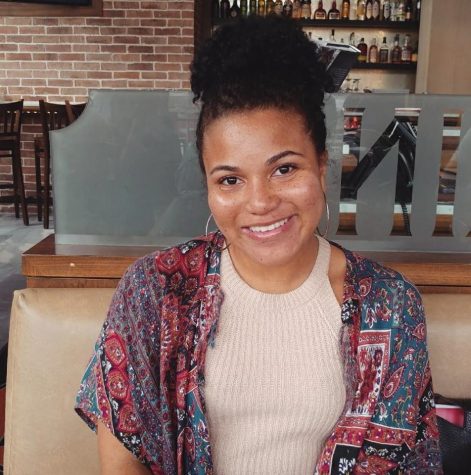Closed Doors, Closed Borders: The Muslim Ban on Campus
Originally published in Spring 2017, Issue 21.
After returning to the United States as an international student at AU in 2016, Noman Ahmed Ashraf found that the political climate had changed. Nationals from Yemen were currently banned from entering the United States—Ashraf is from Yemen.
Following the initial announcement of President Trump’s executive order “Protecting the Nation From Foreign Terrorist Entry into The United States,” nationals from Iraq, Iran, Somalia, Yemen, Libya, Sudan, and Syria were banned from entering the United States for 90 days. Although the executive order was updated on March 16, 2017 to exempt Iraq and clarify confusing language, the message was still clear: The United States is closing its doors.
“In some ways, [the ban] reminded me of 9/11 … where I felt like the US was beginning to, in many ways, close itself to the rest of the world,” said Dr. Fanta Aw, the Vice President of Campus Life at AU. “At a time when we have to be thinking about how we are interconnected, this is not the time to retreat because this will have a chilling effect on the rest of the world.”
Many international students, like Ashraf, try to facilitate a sense of interconnectedness when they study abroad in the United States. However, the temporary ban on some nationals, as well as the promise to tighten screening and vetting for obtaining visas, is directly affecting those who had planned to come here.
“People come here to study, to exchange cultures,” Ashraf said. “And when I was here on my exchange year in high school, I felt like I was bridging the gap, linking things together, and getting to know the two cultures. All of a sudden that is going to be destroyed because that is not going to happen anymore.”
For many the executive order is not just a ban, but a message of, ‘You’re not welcome.’ Those from affected countries are beginning to worry about the sentiments that the United States holds towards them. Aw says this could affect their desire to come here.
“There’s real fear of xenophobia that’s setting in that I think, for families and for students, will certainly give them pause about whether or not the U.S. is the place to currently be,” Aw said. “And I think that will have an impact for university enrollments in the fall.”
As of now, many international students want to come to the United States to study. According to the Institute of International Education, a nonprofit organization that focuses on international student exchange and aid, there are currently 1,043,839 international students in the U.S. There are 15,840 students from the seven originally banned countries.
Although the updated ban does not affect students who currently have a valid visa, students are still apprehensive that their situations could change at any minute as a result of Trump’s policies.
“To be so far from home and from all you know in the pursuit of your education, because you believe that education is such an important asset,” Aw said. “To then find that there is this executive order … I was really concerned that it would create fear for students. And I didn’t want that to be the case.”
During his campaign, President Trump called for a “complete and total shutdown of Muslims entering the United States.” Given his campaign promises, the current political climate and the implementation of the executive order has evoked a sense of uncertainty and worry among students.
“I was more worried about my friends. I was worrying things could go bad,” Ashraf said. “I know some friends who are thinking about what if Trump decided to deport all of the people from the seven countries, including students.”
—
President’s Trump’s reasoning behind the executive order implementation is to strengthen national security. According to the White House press release for the executive order, its purpose is to to detect and prevent individuals with terrorist ties from entering the United States. The release says that there have been numerous cases of foreign-born individuals either involved in or responsible for terrorism-related crimes since September 11, 2001.
According to a report from the Cato Institute, a public policy research organization, only 17 out of the 154 foreign-born people convicted of carrying out or attempting to carry out a terrorist attack in the U.S. from 1975 to 2015 were from the countries listed on the travel ban. As a result, protesters termed the executive order as a “Muslim Ban,” because it targets Muslim-majority countries. It has been labeled an act of bigotry rather than a necessary national security measure.
“You’re way disproportionately scared of something that is not going to hurt you,” said Jeta Luboteni, Vice President of the Muslim Student Association, a religious organization that maintains Islamic societies at AU. “There are other things that you can pressure your government to do to not have [terrorism] happen.”
Despite this, 7 in 10 Americans report that they are very or somewhat concerned about extremism in the name of Islam, according to the Pew Research Center. 54 percent say that they approve of the executive order.
However, Ashraf explained how international students view the executive order as more than just strengthening national security.
“All of a sudden when [international students] hear a ban for seven countries and the government here in the U.S. relating it to National Security … they are not going to respect the fact that America wants to keep itself safe,” Ashraf said. “They are going to think that America is becoming more racist and they are going to think that America is becoming more isolationist and trying to separate us.”
Considering that anti-Muslim hate groups in the United States tripled from 34 to 101 during President Trump’s campaign trail, the executive order was indicative of his campaign promises. However, that leaves many students feeling scared and vulnerable.
“I feel like there are a lot of international students here who are not willing to risk them being here to go to some MSA event … and people shouldn’t have to be scared to live their lives,” Luboteni said.
Aw said that the intended or unintended message the executive order is sending is doing more harm than good for the safety of the United States.
“One of the ways to strengthen your national security is to build friends and allies around the world,” explained Aw. “It is the single most potent national security you can get.”
Reina DuFore is a sophomore studying international relations.

I'm a senior majoring in International Service. My areas of interest are gender rights, refugee rights, mental health, race relations, immigration,...







